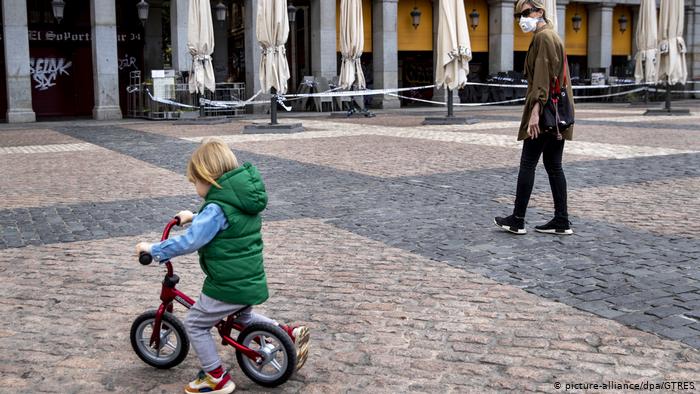
Spain's government will release on Tuesday a plan for a gradual "de-escalation" of its coronavirus lockdown, one of Europe's strictest.
Spaniards have been home for six weeks, after the country's coronavirus cases and deaths shot up exponentially in mid-March.
Prime Minister Pedro Sanchez's government has been developing the gradual lockdown easing plan over the past few weeks and plans to present it to Cabinet.
Health Minister Salvador Illa said that Spain had managed to control the epidemic and that the country's health system was also capable of handling a possible "second wave."
"The goal now is to continue to hold a sustained increase in cured cases and that the new daily infections remain in the 1% range," Illa said.
Outdoor walks allowed
The health minister said that the gradual lockdown easing will have to be "step by step, with a lot of caution and good judgement." Authorities have insisted that strict hygiene and social distancing is a requirement in outside spaces.
Lockdown easing began Monday, when for the first time, children under 14 were allowed to go outside for one hour with one parent, albeit under strict social distancing rules.
The gradual de-escalation is expected to be the same for all regions, with some exceptions that will depend on how severely an area is affected.
Starting on May 2, Spaniards will be allowed to go for walks with members of their own household and engage in outdoor sports.
Economic activity in factories may also be slowly restarting. A Barcelona factory for Spanish automobile manufacturer Seat began partial production on Tuesday, under strict social hygiene rules and with only 3,000 of its 11,000 workers.
Volkswagen, Mercedes Benz and Nissan factories in northern Spain were also preparing for partial reopening.
Antibody testing
The Spanish government is following the lead of countries like Italy in pairing its lockdown easing with antibody testing. Public health authorities said it was critical for them to "understand the real scope of infection."
Raquel Yotti, director of the Carlos III Health Institute, said that these efforts include calculating the number of people who have had contact with the virus and which have developed antibodies,
Some 90,000 people from 36,000 households, who were selected based on statistical criteria, have volunteered to participate in the study.